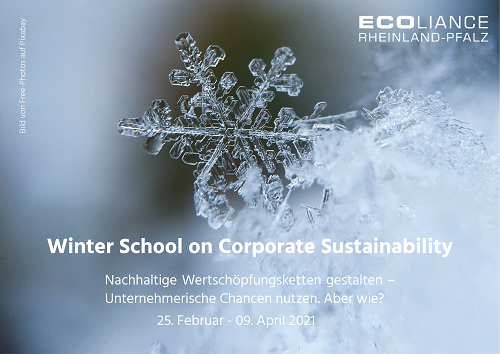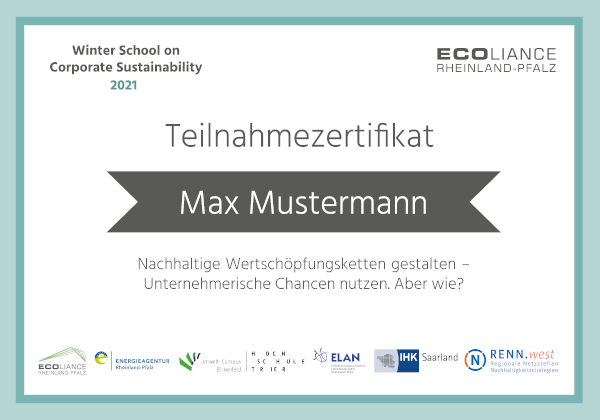Winter School on Corporate Sustainability 2021
The winter school “Sustainable management – but how?” offers a good introduction to the topic with overview and in-depth workshops that, together with companies from Ecoliance Rhineland-Palatinate, also provide an insight into the implementation of sustainable instruments in operational practice and highlight advantages and pitfalls.
Companies are facing enormous challenges. Securing skilled workers, digitalization, global markets and climate change are just the most obvious keywords of a social change that needs to be shaped.
Sustainability expertise and sustainability documentation are thus becoming decisive economic factors for the business models of companies and for Rhineland-Palatinate as a business location.


Registration & certificate of attendance
The Winter School on Corporate Sustainability is free of charge and takes place exclusively online.
The digital transmission takes place via Microsoft Teams. You can register up to two days (48 hours) before the start of the event. You are free to choose your participation in the individual modules.
You will receive the registration link and further information for the selected module by e-mail after you have registered. You will receive a certificate of participation if you take part in all modules.
The Winter School on Corporate Sustainability is recognized as an advanced training event by the Rhineland-Palatinate Chamber of Engineers. When registering, please indicate your wish to receive continuing education credits.
The Online Winter School will take place from February 25 – April 09, 2021. Learn more about future business models in six different modules.
Download area of the Winter School
Click here to go to the download area where additional materials on past modules are available.Cooperation partner
The link will take you to an overview of the cooperation partners of the Winter School with a brief description of the partners.Your hosts
The link will take you to an overview of the Winter School hosts with a brief description of each person.Overview of the modules
The following modules are offered in the Winter School. You can register for all or just individual modules.
Sustainable business practices are becoming increasingly important. This was also recently brought into the European focus with the Green Deal. Companies and investors are continuing to develop sustainably. But what requirements are necessary? How can the European objectives and the Green Deal be implemented regionally? And what do companies need to do this?
Six topics of sustainable management are addressed in six modules. We start with an overview.
This is followed in Module #2 Operational implementation of sustainability reporting, monitoring and auditing, certification in which, among other things, an overview of the various sustainability reporting standards is given.
Module #3 describes C02 and GHG accounting, footprints and procurement, supply chain management, from the perspective of municipal administration, municipal suppliers and companies.
Module #4 Operational energy management, resource efficiency, material and process efficiency illustrates how digitalization can contribute to improving resource and energy efficiency.
Module #5 Circular economy approaches in the company explains, among other things, the legal framework conditions for applying the circular economy.
And in Module #6 Sustainable Finance and Compliance, ESG and Sustainability Strategies in Business Models, you will learn about sustainable management from different perspectives.
We combine the view from science with the perspective of companies and municipalities with the aim of building a C02-neutral economy.
Among others with:
Dr. Ulla Engelmann, DG Grow European Commission
Prof. Dr. Henrik te Heesen, Environmental Campus Birkenfeld
Werner Zimmermann, Chairman Ecoliance e.V.
Tamara Breitbach, Environmental Campus Birkenfeld
Michael Hauer, Rhineland-Palatinate Energy Agency
Prof. Dr. Klaus Helling, Environmental Campus Birkenfeld
1st date: February 25, 2021
Time: 17:00 – 19:00
Download module description
Download speaker profile
Sustainability reporting and certifications are proof of your corporate sustainability strategy. Whether as a unique selling point to meet customer requirements or to identify risks and opportunities, management tools such as ISO 14001 or ISO 50001 or sustainability reporting standards such as the German Sustainability Code (DNK) or the standards of the Global Reporting Initiative (GRI) are excellent aids. You can find out how to implement these successfully in your company here.
What to expect on Thursday:
Klaus Helling from the Environmental Campus, an expert on sustainability reporting in companies, will join Yvonne Zwick, Chairwoman of BAUM e.V., the largest environmental initiative in German industry, and Tanja Castor, responsible for the content and strategic orientation of the sustainability content of the integrated report (including regulatory requirements, requirements from standards such as GRI, SASB … ) at BASF will give an overview of the current industrial requirements for sustainability reporting. Andreas Laux from Ecoliance member AZMcert will give an impulse on how management systems can provide figures, data and facts for sustainability reporting.
What to expect on Friday:
In two workshops, you will learn more about the German Sustainability Code (DNK) and gain in-depth insider knowledge on setting up management systems for the environment and energy. The DNK will be explained in detail by Florian Harrlandt, who works in the Sustainability Team at the German Council for Sustainable Development (RNE). He will provide important information on the use of industry guidelines, how to fulfill CSR reporting obligations with the help of the DNK and insights into best practice examples. Andreas Laux will present current trends and requirements for environmental and energy management systems, highlight current trends and further developments in standards and provide practical tips for successful external audits from a certifier’s perspective in his workshop.
Among others with:
Prof. Dr. Klaus Helling, Environmental Campus Birkenfeld
Andreas Laux, AZMcert
Yvonne Zwick, Chairwoman B.A.U.M e.V.
Tanja Castor, BASF SE
1st date: March 04, 2021
Time: 5:00 – 7:00 pm
2nd date (in-depth workshop): March 05, 2021
Time: 12:00 – 15:30
Sustainable companies must take responsibility for their supply chains. Saving greenhouse gases in the supply chain not only leads to a reduced ecological footprint, but often also to cost reductions. Customers are not only interested in an ecological end product, but also in how the entire company, including its suppliers, is positioned in terms of its footprint. What to expect on Thursday:
Local authorities are also clients and are increasingly stipulating sustainability as a criterion in their procurement in order to achieve the goals they have set themselves. Companies can improve their footprint by imposing requirements on suppliers. Sustainability offers opportunities when new business areas are opened up, niches are filled, synergies are exploited or efficiency potential is discovered and leveraged during the balancing process. Representatives from a municipal administration, a municipal supplier and a company will talk about their views and opportunities for “shaping sustainable value chains and exploiting business opportunities”. The participants will also explore the challenges and opportunities of the Supply Chain Act and what options are available for designing climate-neutral products or offsetting emissions.
What to expect on Friday: Eric Dolch from the Development Policy Network and Peter Kolbe from Climate Fair will focus on the global perspectives of supply chains. Consumers are increasingly rejecting products that are the result of exploitation and inhumane labor. Setting clear standards here can become a selling point for companies. The recently passed Supply Chain Act is intended to ensure transparency. It is important that companies start thinking concretely about implementation now.
Among others with:
Peter Kolbe, Climate Fair
Nicolas Wiedemeyer, Stadtwerke Trier
Fabian Bucksch, Robert Bosch GmbH
Dr. Christel Simon, Rhineland-Palatinate Energy Agency
Erik Dolch, ELAN e.V.
1st date: March 11, 2021
Time: 17:00 – 19:00
2nd date (in-depth workshop): March 12, 2021
Time: 12:00 – 15:30
Download module description
Download speaker profile
Rising energy costs and finite raw materials are leading to a rethink in business and society in times of climate change. Potential savings and optimizations, whether in materials, manufacturing processes or in the business model, are part of corporate planning and management. Learn what contribution digitalization can make to improving resource and energy efficiency.
What to expect on Thursday:
The efficient use of energy and raw materials saves companies enormous costs. These cost-saving potentials are often significantly more in the sum of individual measures than is realized in everyday business. The introduction of operational energy management can be supported by intelligent software systems. On the basis of efficiency-related key figures and energy monitoring, the introduction of efficient resource management in the company can be made attractive and transparent. This article is dedicated to innovative approaches on how operational energy and resource management can be set up professionally and sustainably today with increasing digitalization.
What to expect on Friday:
Saving costs and protecting the environment – this is precisely the concept that the Rhineland-Palatinate Efficiency Network has been pursuing for almost twelve years. The efficiency check – EffCheck for short – has met with great interest. More than 200 companies have already taken advantage of this offer from the Efficiency Network, which is managed by the State Office for the Environment. Two of them are reporting today on how their company has implemented it. The Association of German Engineers will also be presenting digital tools and highlighting the importance of digital change in companies.
Among others with:
Sabine Riewenherm, State Office for the Environment
Prof. Dr. Susanne Hartard, Environmental Campus Birkenfeld
Dipl.-Ing. Philipp Menn, VDI-ZRE
1st date: March 18, 2021
Time: 17:00 – 19:00
2nd date (in-depth workshop): March 19, 2021
Time: 12:00 – 15:30
Download module description
Download speaker profile
The circular economy is climate protection in action. We show companies the way to the circular economy, from strategy development to stakeholder management, and provide advice on implementing sustainable processes and products. The circular economy pursues the vision of a world without waste. Find out how material flow management enables the implementation of the circular economy through the development of sustainable business models.
What to expect on Thursday:
Circular Economy as a potential for business model development will be explained in a practical way today. The focus is on the concrete implementation of circular economy in companies. In Germany, the circular economy is still predominantly understood as a synonym for waste management. However, the circular economy is more than that: it is an economic model that aims to conserve resources, preserve the value of materials and products for as long as possible and reduce waste to a minimum. Existing legal regulations from the law of the circular economy are presented and critically evaluated. At the same time, examples are given of the impetus that could be provided by new approaches.
What to expect on Friday:
The European Eco-Design Directive defines requirements for the environmentally friendly design of energy-related products and specifies minimum requirements. The majority of products that fall within the scope of the Eco-Design Directive are controlled by software. There are no legal requirements for the energy efficiency of software products, although software has a major influence on energy consumption. For this reason, resource-efficient software has been developed as the basis for awarding a Blue Angel for software, which is being presented today.
Among others with:
Eveline Lemke, Thinking Circular
Prof. Dr. Peter Heck, lfaS, Environmental Campus Birkenfeld
Jürgen Priesters, TOMRA
1st date: March 25, 2021
Time: 5:00 – 7:00 pm
2nd date (in-depth workshop): March 26, 2021
Time: 12:00 – 15:30
Sustainability in the financial system incorporates environmental and social aspects as well as aspects of corporate governance into the decisions of financial players. The aim is to transform into a sustainable economy that also addresses sustainability risks in an appropriate manner for SMEs. ESG and sustainability strategies in business models are exciting approaches that we present in this module.
Among others with:
Prof. Dr. Frank lmmenga, ICESG, Environmental Campus Birkenfeld
Martin Baussen, GLS Bank
Michael Hauer, Energy Agency RLP
Marcel Leistenschneider, Systainalytics
Ulrich Hartmann, PwC
1st date: April 08, 2021
Time: 17:00 – 19:00
2nd date (in-depth workshop): April 09, 2021
Time: 12:00 – 15:30
Download module description
Download speaker profile
